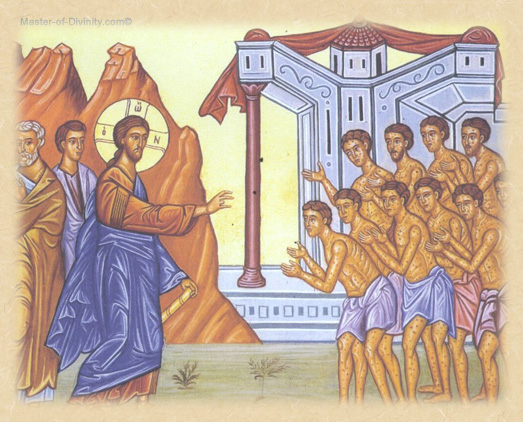The vitrue of gratitude.Luke 17:12-19.* The Thirty-Fourth Sunday after Pentecost.
Return to ByzantineCatholicPriest.com. |
 10:36 AM 1/16/2011 — Of course the Gospel today focuses on the virtue of gratitude. We’d probably all agree that gratitude is a rare enough quality when it comes to how we deal with one another; but, it’s just as rare, if not more so, in our dealings with God. And today we are presented that incident when our Lord encountered ten lepers, and cured them all, but only one came back to give thanks. And our Lord even asked him, “Why are you the only one who came back to say thank you? Where are the other nine?” And I don’t wonder if that ratio isn’t accurate. We are grateful for maybe a tenth of what we should be grateful for. 10:36 AM 1/16/2011 — Of course the Gospel today focuses on the virtue of gratitude. We’d probably all agree that gratitude is a rare enough quality when it comes to how we deal with one another; but, it’s just as rare, if not more so, in our dealings with God. And today we are presented that incident when our Lord encountered ten lepers, and cured them all, but only one came back to give thanks. And our Lord even asked him, “Why are you the only one who came back to say thank you? Where are the other nine?” And I don’t wonder if that ratio isn’t accurate. We are grateful for maybe a tenth of what we should be grateful for.
It’s easy to focus on what’s wrong with our lives, and everyone has something wrong. There’s no one who wouldn’t say that there isn’t something in his or her life that he wouldn’t want to change somehow. For some it may be something trivial; for others it may be something monumental, like a marriage that’s gone bad, or a child that’s in trouble, or a serious health problem. There’s always something negative that we can think about. And when there’s something wrong, it’s very difficult to put that aside and say, “Yeah, but look what’s right with my life. Look at how fortunate I am aside from this problem.” There’s always something to get depressed about if what you want is to be depressed.
Many times over the years we’ve spoken here about what we call Spiritual Maturity. A spiritually mature person is one who can receive the crosses given to him in life, not necessarily without hardship, not without difficulty or suffering, not even without complaining sometimes, but without any effect on the strength of his faith. It is said that the first sign of maturity in a child is when he first realizes that mom and dad know better, not because he’s seen the reason of his parents’ position, but because he understands that they are more experienced than he, and therefore understand things that he can’t yet. And that same thing is true in our relationship with God: we can say we are spiritually mature when we can realize that God’s ways are not our ways; and that it isn’t necessary to understand why this or that has happened, except to understand that God has a handle on it even if we don’t. It takes a lot of humility to reach that point in life; but humility is also a function of maturity.
Remember back at the beginning of Philip’s Fast I gave you an examination of conscience? Here’s a question you can add to it: Am I grateful for everything I have received? or do I choose, instead, to brood about what I think has been denied to me?
Father Michael Venditti
* The Typikon provides no Gospel readings beyond the 32nd Sunday after Pentecost; yet, because of the date of Pascha, Sundays after Pentecost, during which the Gospel of St. Luke is read continually, continue until the beginning of the Triodion. Therefore, the Typikon directs that portions of St. Luke's Gospel be repeated, beginning with that for the 29th Sunday after Pentecost, which is read today (particularly since it was supplanted by the pre-Nativity Gospels earler). Thus, the reading of St. Luke's Gospel continues on Sundays, while St. Mark's continues to be read during the week, until the Sunday of the Prodigal Son, February 20th, at which point the Triodion Gospels commence.
|

